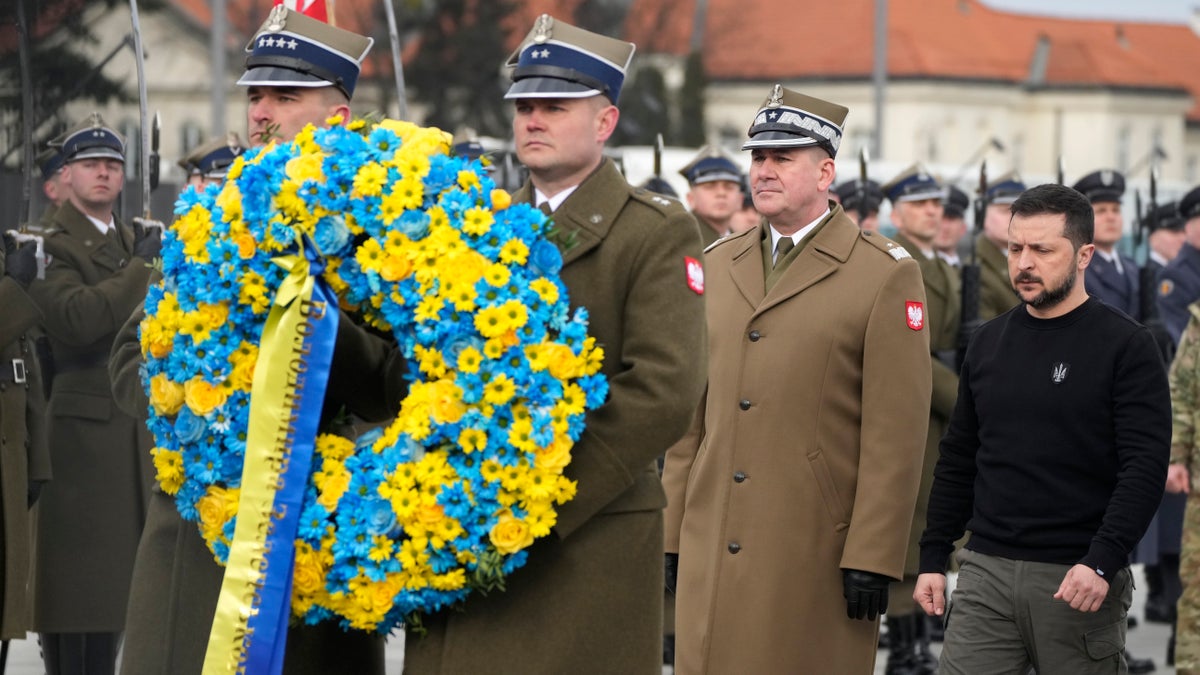
Poland has emerged as one Ukraine's most ardent supporters during Russia's invasion despite historical grievances between the neighboring nations that stir up bad feelings to this day.
The tensions between the country at war and its staunch ally were acknowledged Wednesday when Ukrainian President President Volodymyr Zelenskyy made a state visit to Poland, where President Andrzej Duda received him with honors.
Duda promised that Poland would keep helping Ukraine fight off Russia's agression, but he also acknowledged at a joint news conference with Zelesnkyy that the relationship was complicated.
”There are still open wounds in the memory of many people,” Duda said, an obvious reference to the massacres of some 100,000 Poles by Ukrainian nationalists during the 1940s. Poland considers the killings genocide.
The difficult past in Poland-Ukraine relations goes back even further than than. In a part of Europe where entire nations have disappeared from maps for generations before returning from the ashes of collapsed empires, sometimes at the expense of neighbors, Poles and Ukrainians share a history of existential rivalry.
Ukrainians, for example, harbor resentment from centuries spent under Polish rule, a period which is not remembered as completely benign.
Polish and Ukrainian officials have avoided mentioning the old grievances openly as they remain focused on Ukraine's survival and worry that Russian could exploit any divisions. It is, after all, a war whose outcome will determine Ukraine's very existence and Poland's own security for decades to come.
Zelenskyy said the two nations would be able to address the lingering hard feelings more fully after the war in Ukraine.
“In the future, there will be no borders between our peoples: political, economic and — what is very important — historical," Zelenskyy said in a Telegram message before his meeting with Duda. "But for that we still need to gain victory. For that, we need to walk side by side a little more.”
By addressing the past even tangentially in the context of talks on military aid and Ukraine's economic reconstruction, the two leaders seemed to acknowledge that thorny issues could not be swept under the rug forever, even with the war dragging on.
Duda and other nationalist authorities face pressure from their political base, which includes many older Poles, to make sure Polish suffering at Ukrainian hands is not forgotten. A parliamentary election in Poland before the end of the year will be a test for the ruling party, Law and Justice, and determine whether it wins a third term.
On Wednesday, though, Zelenskyy was met with red carpets and pomp. Duda bestowed on his visitor Poland’s oldest and highest civilian distinction, The Order of the White Eagle. “You are surely one of the most outstanding people who has received the distinction," the Polish president said.
Zelenskyy called Duda a friend and said Polish-Ukrainian relations have never been so good. At the same time, Duda insisted the past must not be forgotten and now was the right time to confront it.
“We cannot forget those who have perished in the past,” Duda said. “There are no taboo themes between us.”
Probably the touchiest point of contention is how to remember one of Ukraine’s national heroes, Stepan Bandera, the far-right leader of the Organization of Ukrainian Nationalists who briefly allied himself with Germany's Nazis.
Efforts by Bandera-led forces to carve out an independent territory for Ukraine led them to perpetrate atrocities against Poles, Jews and Soviets.
Such subjects were off-limits during the Soviet era, when Ukraine was a Soviet republic and Moscow also controlled Poland.
Historians say that more than 100,000 Poles, including women and young children, perished at the hands of their Ukrainian neighbors in areas that were then located in southeastern Poland and are mostly in Ukraine now.
The peak of the violence was on July 11, 1943, known as “Bloody Sunday,” when the Ukrainian insurgent fighters carried out coordinated attacks on Poles praying in or leaving churches in more than 100 villages, chiefly in the Volhynia region.
Polish officials insist that only the full truth can strengthen the nations' ties.
Poles were angered in January when Ukraine’s parliament commemorated Bandera on the 114th anniversary of his birth by tweeting an image of the current commander of the Ukrainian armed forces against a portrait of Bandera. The post was later deleted.
Polish Prime Minister Mateusz Morawiecki said his government took “an extremely critical stance toward any glorification or even remembrance of Bandera.”







